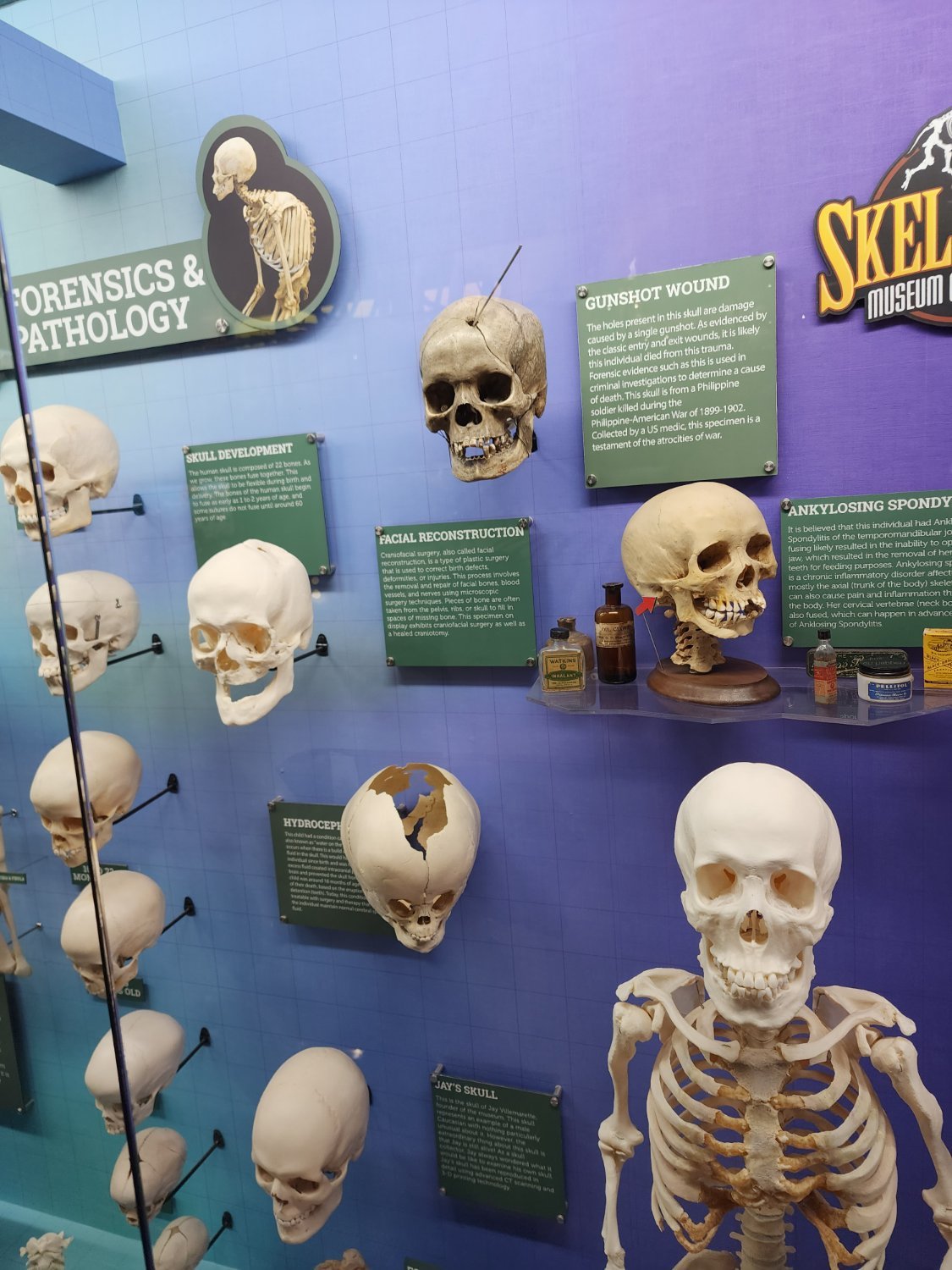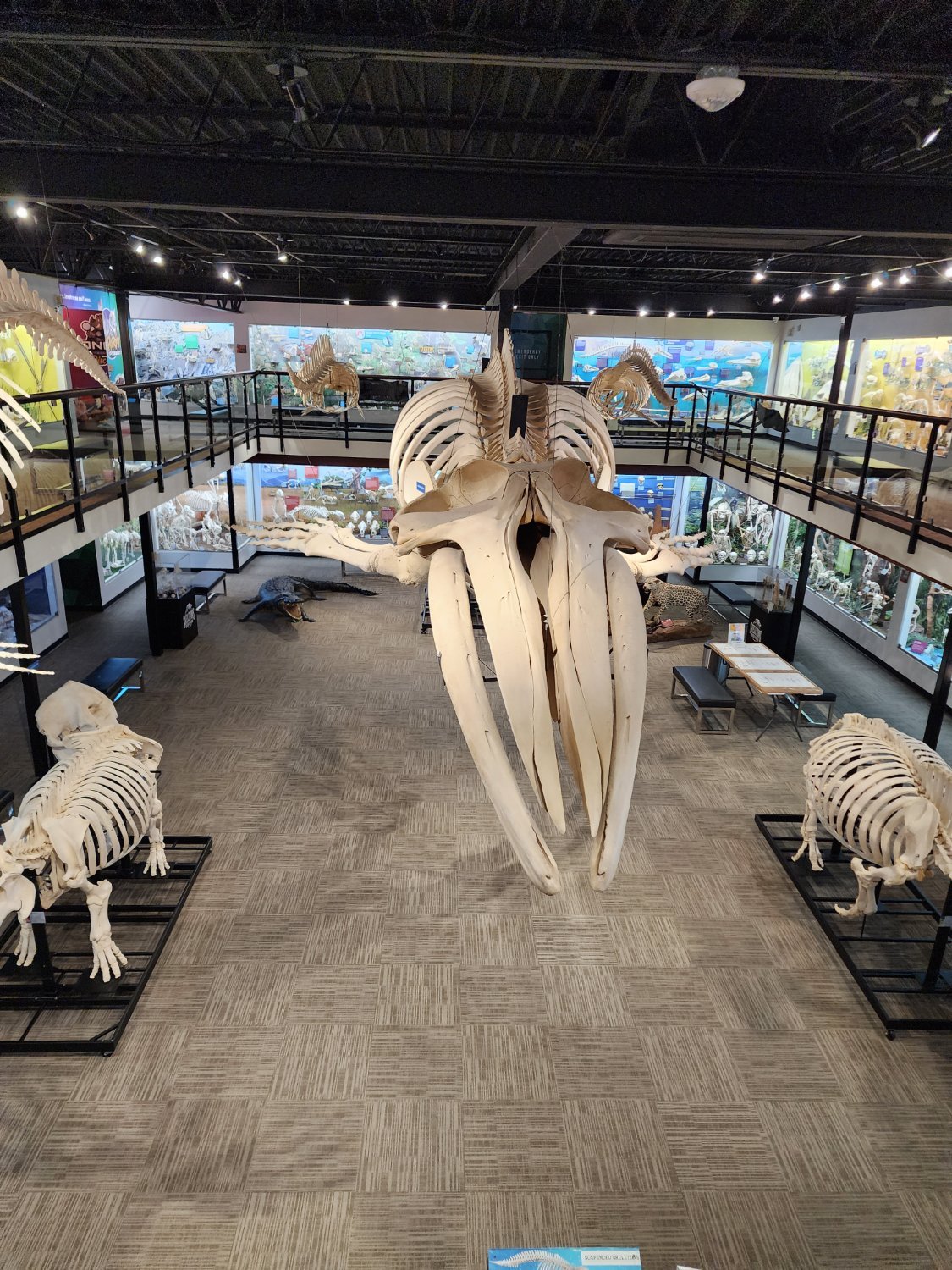No, I don’t want to buy one. This came out of a discussion about my brother, who is so much weirder than me if you can believe it, who owns a real human skull.
I don’t know how he got it. I don’t know where he got it from, maybe this company, more importantly, I don’t know why he would want such a thing. He is not a scientist, he works in IT. He did get an MFA in theater, wanted to be a professional theater director and loves Shakespeare, I can’t believe the reason was because he wanted Hamlet to be super authentic.
We’re not all that close, so it really hasn’t come up in conversation. I only know about it because he posted elsewhere a while back that he was on a Zoom meeting at work and he showed it off and couldn’t understand why everyone stopped laughing and got silent. So obviously he thinks it’s cool to own it.
It used to be a person. I’m an atheist and I don’t believe in an afterlife, but that’s just basic disrespect.
Anyway… how can you ethically source a skull and then sell it on the open market?
TBF most people already have an ethically sourced human skull.
I didn’t consent to having a skull. Though it’s kinda grown on me.
John Oliver had an episode where the main story answers your question.
Basically, if you donate your body “to science” there’s a chance it could end up with such a company. I wouldn’t call it ethical, but as of now it’s legal.
Well that’s fucked. If I donate my body to science, it certianly isnt so my skull can sit in some dudes living room
There’s this woman who donated her body to science when she died ended up in the army being blown by IEDs.
You say that like it’s a bad thing?
I believe the science company sold her body to the military.
Well yeah, I figure when she signed her body up for science she was thinking about Medical Science and not Explosive Device Science…

I’d be totally okay with that, as long as he attempted necromancy
This is where I disagree with the rest of society. Dead people are dead and don’t have rights, so I don’t see how most skulls would be unethical.
So the real question is will it upset the living and how much do you want to accommodate those people’s feelings? I’m not sure there’s a clear and unambiguous answer to this question.
I think it’s a murkier area than you’re thinking. What if the skull was of a slave or of a Holocaust victim? I think selling such skulls would be highly unethical.
Does it matter? I understand this could be emotionally sensitive for some people but the only reason I could see this being relevant is if my purchase somehow induced more slavery or genocide. That seems very unlikely—in fact I can think of a number of common purchases people make all the time without a second thought that are far more likely to encourage such crimes.
I would be concerned that a market would take place, where money could be made selling them, creating more incentives to acquire skulls… you see where this is going?
I think it does matter, yes. I think it’s exploiting a horrific tragedy. You don’t know why the person is buying it. Maybe the person is buying the Holocaust victim skull because they’re a Neo-Nazi and they intend to stomp on it at a party.
The possible future actions of a morally corrupt bigot have nothing to do with whether or not this collection of bones ought to be sold. I don’t think they should be sold just because I think it’s weird to purchase a person, even after death. But I don’t think there’s anything wrong with donating said bones to a research lab. The person who died is gone. They no longer exist. Only their loved ones matter in that they may be upset by the use of their remains.
Bones are relics and relics only have the value we ascribe to them.
Would you say the same about an executed person’s organs if they had no next of kin? China should be free to harvest them like they do now? The person who died is gone.
The problem there isn’t the use of the organs, but that they’re murdering someone to harvest the organs.
How do you know the skull wasn’t harvested from the same prisoner?
Sure, if someone died of natural causes. Use them to save someone who is otherwise dying.
That’s not what I said.
I think selling such skulls would be highly unethical.
Would you? Why? FWIW I agree that as long as there’s a living person who cares about the fate of the bones then selling them would be unethical, I’m just curious as to your specific reasons - like, what is the hypothetical you’re imagining, behind this statement? Are you contending it would be unethical even if nobody living cares, just due to the provenance? I can see why you would object if the former user of the anatomy believed in the sanctity of remains, for example.
I’m not sure I’d agree, but I’m not sure I’d disagree either. I’d need to think on it more. Right now, I’m leaning towards respecting the wishes of the dead as far as their remains go, because the universe is big and cruel and the only kindnesses are those we make for each other, so why shouldn’t that extend as far as we do?
Because I think there are living people who care about the fate of the bones. You don’t think there are lots of people who would object to such things? There are.
This isn’t theoretical. People are criticizing museums for having the bones of slaves.
just wanted to note that the fundamental basic of civilization is burying your dead. at least according to archeologists. without honoring those who came before you, we are beasts.
We are beasts. The separation between humans and animals is pure mythology. This idea is part of that myth.
Fine, the dead are dead and don’t have rights.
But what about the living relatives and descendants do they have rights?
Dead person or dead person’s family donates his body to science. This is usually done under the agreement that when whatever organization is done sciencing with it, it will be respectfully disposed off(cremated or buried) or returned to the next of kin. It is not usually left to the whims of the organization to sell it like scrap parts.
Without traceability for each and every skull there is no assurance that this was done ethically. There are just so many hypothetical scenarios in which this could affect the rights of next of kin. If its not traceable, its not ethical.
They only really say their skulls are legally obtained. i.e. it wasn’t stolen and no one was murdered for it.
We are committed to ethical sourcing. We follow all relevant laws and regulations to ensure that our specimens are obtained legally and responsibly.
Likely many of these are discarded donations to science, legally purchased from the organization doing the “discarding”. It absolutely does not follow that it was ethically sourced.
Unless you have traceability of each and every skull and a proof of informed consent (from the person whose skull it was, saying that they donate it for sale)for each skull there is no way to properly claim it was done ethically.
My friend is a medical librarian and stumbled across two full real skeletons being thrown away, she took their skulls. So yeah ethically sourced and she actually had a website where you could order different human bones left over from cadavers. So they’re not that hard to source, a lot of people donate their body to science, which is good.
Donating your body to science is not the same as donating it to be sold on the open market. If it’s just sold on a website, sure, a scientist could buy it. But also a guy could buy it so he can fuck the eye sockets.
And why should eye care if eye’m dead?
It’s not just about you. Your partner or parent or child or sibling might care.
I can recommend the Last Week Tonight Episode about just this topic. At least in the US, there’s basically no difference
https://www.youtube.com/watch?v=Tn7egDQ9lPgThe answer to OP’s question gets pretty obvious when you ask a different question: how can I ethically donate my corpse to some guy who wants to fuck my eye sockets? What do I have to do to ensure my wishes are upheld?
What if I want my children to take possession of my corpse? It’s not a part of my estate; creditors can’t take it from them. Once the probate process has been completed and my estate is completely disbursed, they can auction my corpse to the highest bidder, and keep the proceeds that would have otherwise gone to some filthy fucking financier.
Scientists and medical practitioners aren’t the only people who might want a human skull, nor should they be the only ones with access. An actor may wish to continue performing on stage as Yorick after their death, for example.
Whatever means available for me to monetize my corpse after my death would be an answer to OP’s question.
You are assuming the skulls this company sells were donated. They do not make that claim. They just say they were ethically sourced.
Donating your body to science is not the same as donating it to be sold on the open market.
In the US, it pretty much is the exact same thing though.
I been to a museum and yes they sell real human skulls along with other types.


Just few pictures I took while I visited.
I want someone to drink mead out of my skull after I die and absorb my power. This is my fondest wish.
Describe your powers for a potential future buyer.
Honestly, yeah. I spent decades developing and maintaining it, hopefully will spend a few more decades with it, but after that? I have no use for it anymore, but if it’s still in decent condition, it would be a shame to waste it.
I’d rather have it be of some use to someone, and “drink mead out of it” is very high up the list, right after “use it for science or education” and right before “use it for semi-realistic (but doubly awesome) historical weapon tests or demos”. Other contenders are “deco piece”, “movie/theatre prop” and “ritual implement”.
Actually, that probably applies to most of my body. Reuse or repurpose as much as you can, turn the rest into fertiliser.
Failing that (if my spouse or family can’t stand the thought of cremating my remains, I don’t want to force them), at least bury me with some weapons. Not because I believe in Valhalla, I just want to troll some future archaeologist. Bonus points for mixing eras and qualities, e.g. a wallhanger 1700s cavalry sabre, weapons-grade Xiphos and a non-functional gun reproduction, dressed in a 900s Samurai armour.
“that sounds awesome, I’d totally buy one!” i thought before looking at the price tags. I think I’ll stick with plastic.
That’s another thing I don’t want to know: how much my brother paid.
They are “Skulls Unlimited”.
I’m a little afraid that they have no limits to the skulls that they provide.
“What do you do? Oh, nice, sales! That’s cool. What do you sell?”

John Oliver did a show related to this. There doesn’t seem to be a lot of restrictions on what can happen to your body once it has been donated.
Thank you yes! I think going into that piece I leaned towards the “dead is dead” philosophy but I think John Oliver changed my mind when he talked about the importance of dignity and ethical sourcing.
I’ll bet 10:1 odds if you sent the DNA off to 23 and me it’d come back Uighur.
Historical digs, people donating bodies to science (but aren’t chosen to bomb tests), John/Jane doe.
I don’t think taking them from historical digs would be ethical (archaeologists certainly don’t), and people who donate their bodies for science are donating them for science, not for anyone to buy off of a website. So I don’t think either of those work here.
The article guy linked states that body donations are regulated at the state level, unlike organ donation. That means some states don’t regulate or poorly regulate body donations, and the organizations that accept donations are free to lie to donors and sell bodies and body parts to other organizations, like the military or who-the-fuck-knows. Without regulation, you can get some weirdo employee that just takes a skull after they’re done blowing up the body or studying it at Red State University and sells it privately.
Or it could be some weirdo died and his taxidermied great grandma from the box in the garage didn’t make the cut for the estate sale, so someone took it to the pawn shop. Watch the show Oddities. Fucked up shit gets bought and sold all the time.
See, that’s exactly why I’m thinking there really isn’t an ethical way to do this overall except in circumstances like great grandma (although even then, I’d call selling human body parts on the open market is pretty ethically questionable in general).
Yeah I agree it’s weird and unethical. Unfortunately that doesn’t mean it’s illegal.
I think it should be regulated at the federal level and everything that happens with a body donation should be transparent and traceable. That still wouldn’t affect the stuff that’s already in circulation and beyond identification though.
I don’t know about the law. I am only talking about ethics because the company claims it’s ethical.
I don’t see the problem. Loads of people have skulls of other animals on display. Why should a human be treated any different.
For one thing, there is very little evidence that most other animals have any sort of reverence for the dead.
I could see how one voor find it enjoyable that their skull would be cherished by another human being.
A guy I knew had a skull from the Roman era, that had a hole in it from a ballista arrow. Not the best way to go, but how cool is it that your head can amaze people two thousand years from now
There’s no way that wasn’t a replica. How is that skull not in a museum or something?
It looked convincing enough, but we were quite young back then. The thing that always stuck with me that the hole in the skull was square shaped. It was only untill later that I learned that ballistae arrows did indeed have square arrowheads.
But it coud’ve been a replica, though I’m unsure where one would source one in a manner that wasn’t somehow more dubious than having a real one. (The guy was a historian of sorts). Then again, where I live the Roman history isn’t too far away.
People are saying that that website is selling skulls for 2000-3000$. A roman solider skull Would be a lot more expensive than that, I imagine. Given the age and the historical relevance. So that’s two things to be amazed by when looking at that thing, I think.
If I were him, I’d definitely not mind that fate.
I mean… Vultures and other carrion creatures revere the dead, in their own special ways.
/j
Probably not what you were thinking but there’s plenty of stories of dogs not leaving their owners after death like Greyfriars bobby.
Also elephants are known for mourning their dead.
I think if I donated my body to science and they were all done with it, and they could make more money for research by selling bits off to weirdos that would be fine by me. Maybe put a little QR code on it that people could scan and get a little biography of me. That would probably make archeology a lot easier.
I’m not looking to buy either, that’s so weird… but I do have some to sell. They don’t ask questions do they? I just need to get these off my hands, literally, I’ve been carrying these bags around for awhile. Human skulls are heavy.
You could collect skulls after informed consent. People could potentially sell/donate the rights to their skull after they’re done using it, with maybe some permission from next-of-kin, since they have a certain degree of claim as well.
If everyone agrees though, you could then ethically take that skull and sell it to a third party I suppose. It’d be somewhat similar mechanically to using remains for medical education and/or research, except without the noble cause or broader societal benefit.
Otherwise, in my eyes, this would qualify as grave-robbing and definitely be frowned upon. Nonetheless a fairly common practice throughout history though.
I think informed consent is key - and I know I would give mine for the right sum, unless a family member called first dibs. I am planning to be cremated and a few ounces of ashes more or less won’t make a difference.
I can hardly see any other way to obtain a human skull ethically. If the seller is honest, they should make the signed consent form available to the buyer upon request.
Herein lies the problem. Nowhere on their website can you find any details about informed consent or traceability. All you have are the words “ethically” peppered around the website without any definition as to what they mean by ethically nor any of their processes they use to ensure “ethicalness” of any of their skulls.













